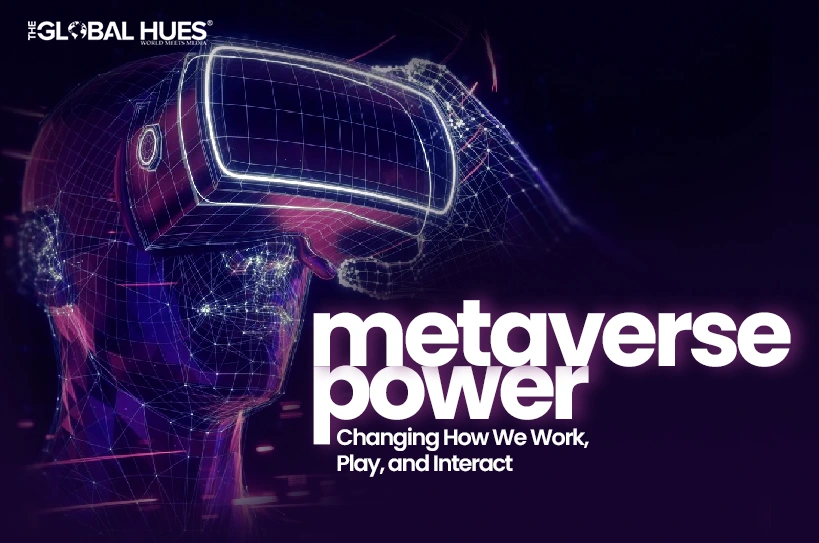According to you, what is the meaning of the word, Metaverse? Is it a virtual world? Or a space where digital and physical realities blend together. It is a bit of both, as Metaverse is a virtual world where digital and physical realities blend together, allowing people to interact, work, play, and socialize in immersive 3D spaces. Think of it as a space or a shared online universe where you can meet others, attend events, shop, and explore new environments, all from the comfort of your home.
Furthermore, it goes beyond just video games or social media. It offers endless possibilities for personal and professional experiences, made possible through advanced technologies like virtual reality (VR), augmented reality (AR), and more.
But what exactly is the metaverse, and why are tech companies, like Facebook, Google, and Microsoft, investing billions of dollars into developing it?
In simple terms, the metaverse is a virtual universe that you can explore and interact with, but it’s more than just a virtual reality (VR) game or a 3D environment. It’s a collective digital space where users can exist, collaborate, and build in ways that mimic or even surpass the real world.
In this article, we’ll explore Metaverse’s potential to change social interactions, work, and entertainment. How the emerging technologies are making it possible, the challenges and ethical considerations you should be aware of while dabbling with metaverse.
How Metaverse is improving social interactions?
One of the most exciting aspects of the metaverse is how it helps transform social interactions. Users can connect with friends and family through apps like WhatsApp, Instagram, and Zoom. The metaverse offers a seamless environment where you can meet people from anywhere in the world in a fully immersive experience.
Imagine attending a virtual birthday party where all your friends’ avatars are present in a beautiful digital space. You could interact with them just as you would in real life—talk, dance, and play games together. This type of experience could make long-distance friendships and relationships feel more connected. Social media could also evolve, with platforms like Instagram or Facebook shifting from photo-sharing apps to spaces where you experience events together, like concerts or exhibitions.
Even dating might change. In the metaverse, instead of meeting someone for coffee in real life, you might meet their avatar for a virtual stroll on a beach or through a fantasy city. This could open new ways of understanding each other before meeting in person, making social interactions in the digital realm feel much more personal and engaging, especially for people who are introverts and find it difficult to make any sort of connections quickly.
How is Metaverse bringing changes at work?
The COVID-19 pandemic pushed millions of people to work from home, accelerating the use of video calls and virtual collaboration tools. However, these tools have limitations, as they often feel impersonal and lack the natural flow of in-person meetings. The metaverse could change how we work by creating virtual offices where employees can gather more dynamically and interactively.
In a metaverse-based workplace, you could sit in a virtual meeting room with your colleagues’ avatars and interact with 3D models of projects or brainstorm together using virtual whiteboards. Collaboration would feel more like it does in a physical space but without the need for commuting or being in the same city.
It is particularly useful for companies that have global teams, making communication across time zones more seamless. It might also transform industries like architecture, design, or engineering, where working on a 3D model together in a virtual space could be much more effective than using 2D screens.
The Metaverse and Entertainment
Entertainment is likely one of the first industries to fully embrace the metaverse. You have already seen glimpses of what’s possible with virtual concerts. These events attracted millions of people, showing that there’s a huge audience for digital experiences that go beyond traditional video games or social media.
Through the metaverse, entertainment will become more immersive and interactive. Imagine watching a sports game not from your TV, but from a virtual stadium, where you can look around and feel the energy of the crowd. Or attending a movie premiere where you can chat with other fans and maybe even meet the director’s avatar.
Gaming will also reach new heights. Currently, many multiplayer games already have elements of the metaverse, with players creating and sharing digital worlds. But as the metaverse grows, these experiences will become more integrated with other forms of entertainment. You might jump from playing a game with friends to watching a live concert without leaving the virtual world.
Challenges and Ethical Considerations
While the metaverse holds incredible potential, it also raises significant challenges and ethical concerns. Below is a list of these challenges:
- Privacy
In the metaverse, your movements, interactions, and even emotions could be tracked. This could lead to a new level of data privacy concerns. How much of your digital identity should companies have access to, and how can you protect it?
- Digital Inequality
Not everyone has access to high-speed internet or expensive VR equipment. There’s a risk that the metaverse could deepen the digital divide between those who can afford to participate and those who cannot.
- Mental Health
Spending too much time in virtual worlds could lead to issues like addiction or detachment from reality. Developers and policymakers need to ensure the metaverse promotes healthy interactions and doesn’t lead to negative psychological impacts.
- Ownership and Control
Who owns the metaverse? Is it controlled by tech giants, or will it be decentralized and owned by its users? This question is key to ensuring that the metaverse remains a space that benefits everyone, rather than being dominated by a few powerful companies.
The Bottom Line
The metaverse is more than just a buzzword; it represents the next evolution of how you interact with the digital world. With the potential to revolutionize social interactions, work, and entertainment, the metaverse could soon become a central part of our daily lives.




